Overview
The article delineates five pivotal strategies designed to elevate work performance within startups. These strategies encompass:
- Establishing clear goals
- Fostering open communication
- Implementing feedback mechanisms
- Leveraging technology for task management
- Recognizing employee contributions
Each strategy is underpinned by effective methodologies and tools, such as the SMART criteria for goal setting, collaborative tools that facilitate communication, and automated task management systems. Collectively, these elements contribute significantly to enhanced productivity and a thriving workplace culture.
How can startups ensure that their teams are aligned with clear objectives? By adopting the SMART criteria, founders can set specific, measurable, achievable, relevant, and time-bound goals that guide their teams toward success. Furthermore, fostering open communication creates an environment where ideas can flow freely, leading to innovative solutions and a more engaged workforce.
Implementing robust feedback mechanisms is crucial for continuous improvement. Regular feedback not only helps employees understand their performance but also encourages a culture of growth and development. Additionally, leveraging technology for task management streamlines processes, allowing teams to focus on what truly matters.
Recognizing employee contributions is equally essential. When team members feel valued, their motivation and commitment to the organization increase, resulting in a positive impact on overall performance. By integrating these strategies, startups can cultivate a productive and supportive workplace culture that drives success.
Introduction
In the dynamic landscape of startups, where agility and innovation reign supreme, enhancing work performance is not merely advantageous—it is essential. By implementing strategic practices, startups can unlock their teams' full potential, driving productivity and cultivating a vibrant workplace culture. Yet, with a multitude of approaches available, how can startups adeptly navigate the complexities of performance enhancement? This article explores five pivotal strategies designed to elevate work performance, ensuring that startups not only survive but thrive in an increasingly competitive environment.
Establish Clear Goals and Objectives
To establish clear objectives, startups should adopt the SMART criteria: Specific, Measurable, Achievable, Relevant, and Time-bound. This framework not only clarifies goals but also drives work performance. Consider the following key points:
- Specific: What exactly do you aim to achieve? Instead of a vague objective like 'increase sales,' a SMART target would specify 'increase sales by 20% in the next quarter through the launch of a targeted marketing campaign.'
- Measurable: How will you gauge success? For example, 'reduce customer churn by 2% in the next year' provides a clear metric to track progress.
- Attainable: Is your objective realistic? Ensure it is achievable for your team to avoid discouragement from impractical expectations.
- Relevant: Are your objectives aligned with broader business aims? This alignment ensures that every effort contributes to your startup's success.
- Time-bound: What are your deadlines? Setting timeframes maintains focus and ensures consistent progress toward completion.
Regularly reviewing and refining these objectives based on team feedback and evolving market conditions fosters flexibility and concentration. As noted, "SMART goals provide clarity and structure, turning vague ideas into actionable steps." Implementing tools such as OKRs (Objectives and Key Results) can significantly enhance tracking progress and ensuring alignment across teams. As emphasized, 'OKRs keep you aligned as a group and create a sense of responsibility,' ultimately driving work performance and accountability. Furthermore, keeping goals visible through shared dashboards or regular updates prevents them from being overlooked, ensuring that the team remains aware of their objectives.
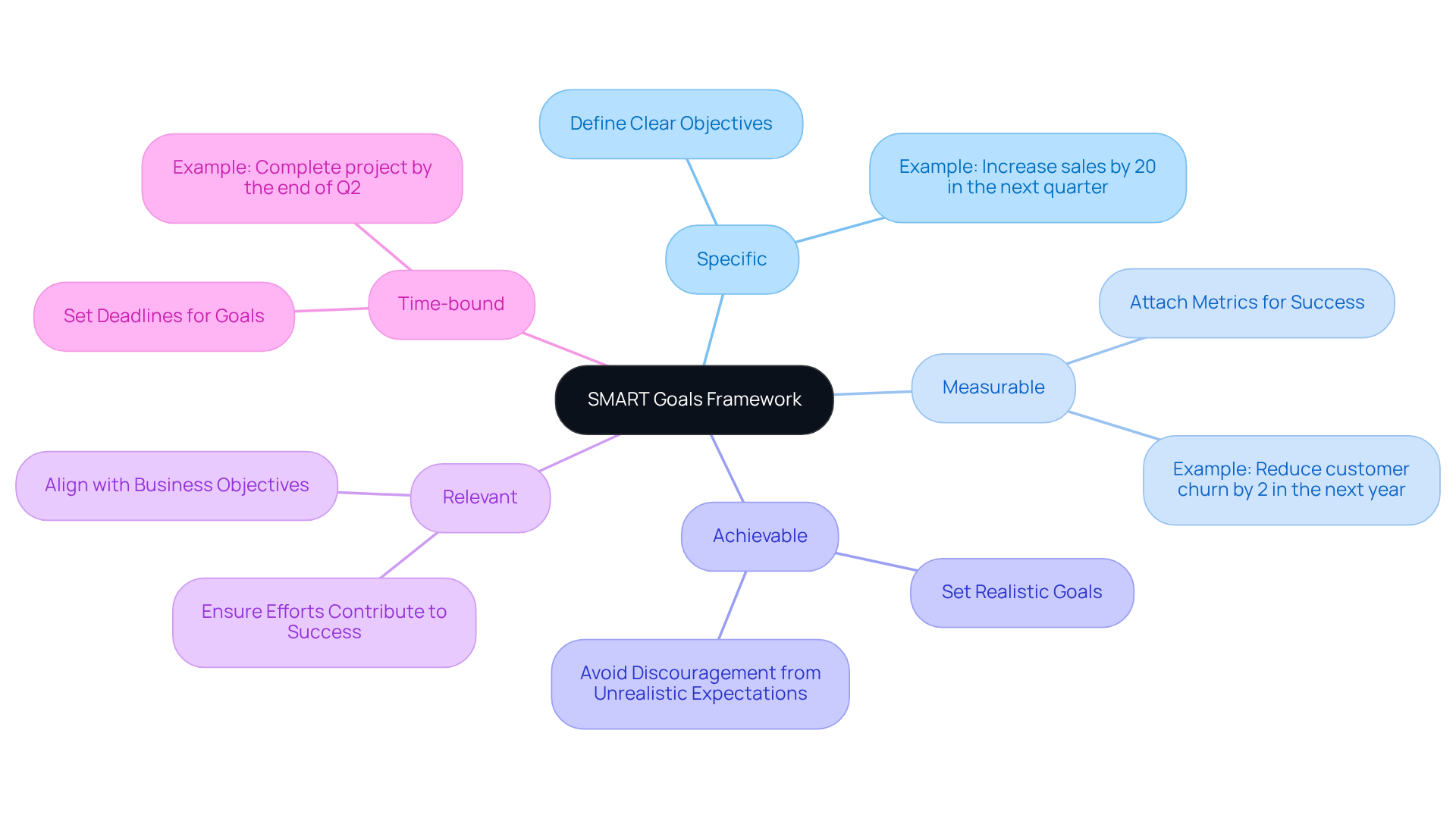
Foster Open Communication and Collaboration
To enhance work performance in startups, it is essential to conduct regular group meetings and utilize collaborative tools such as Slack or Microsoft Teams. These platforms facilitate continuous communication, ensuring teams remain coordinated and informed.
Have you considered how encouraging feedback and practicing active listening can help identify issues early? This fosters a culture of transparency, which is vital for innovation. Establishing a secure environment allows group members to express ideas without fear of criticism, enhancing connections among them and leading to innovative solutions.
For instance, hosting brainstorming sessions can stimulate creativity and collaboration, propelling the group toward shared goals. Research shows that organizations prioritizing open communication experience lower turnover rates and higher employee satisfaction, which underscores the importance of a transparent work environment for enhancing work performance.
Furthermore, effective use of collaboration tools can significantly improve group dynamics by permitting real-time updates and smooth information sharing—crucial elements in the fast-paced startup landscape.
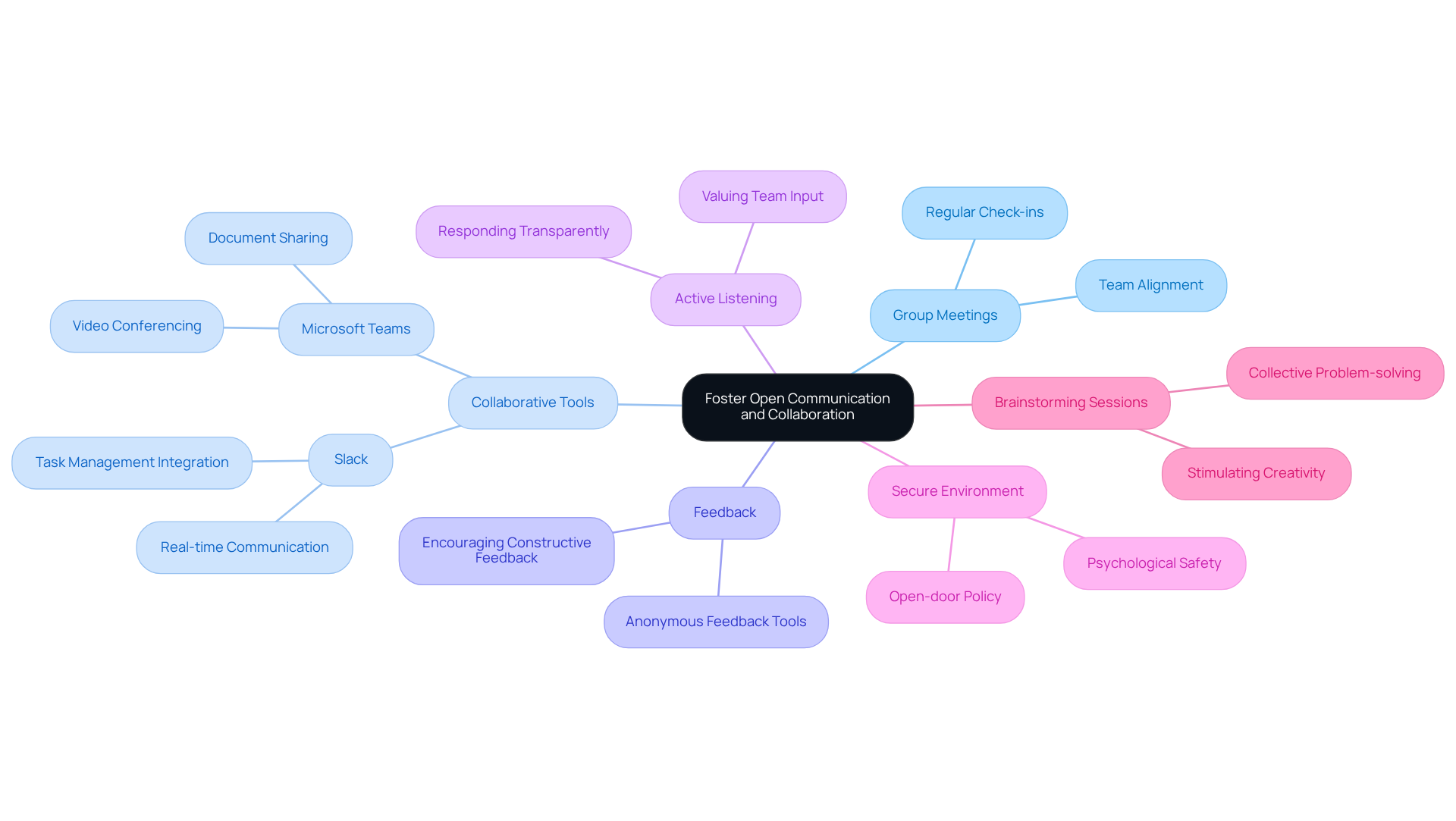
Implement Regular Feedback Mechanisms
Startups must establish a structured response cycle that includes regular individual check-ins and group retrospectives. Tools like 15Five or Lattice can facilitate ongoing evaluations and work performance monitoring, ensuring that feedback is both regular and effective. Frequent check-ins are particularly impactful for work performance; research shows that:
- 35% of millennials
- 40% of Generation X
- 45% of Baby Boomers
report a stronger sense of belonging from these interactions, significantly boosting morale and productivity. How can your team benefit from such practices?
Encouraging peer-to-peer feedback can also enhance group dynamics and improve work performance and accountability. For instance, implementing a 'Feedback Friday' initiative, where team members share constructive insights, can cultivate a culture of openness and improvement. Moreover, employing a response formula such as:
When you [BEHAVIOR], it makes me feel [FEELING] because [TANGIBLE IMPACT]
can improve work performance by providing a structured approach to delivering evaluations. Have you considered how this could transform your team's communication?
Celebrating failures through initiatives like 'Failure Friday' can further promote a culture of learning and resilience. Additionally, leveraging analytics to assess the effectiveness of feedback mechanisms ensures that new ventures can continually refine their processes to enhance work performance and sidestep common pitfalls associated with feedback implementation. Are you ready to take actionable steps toward enhancing your startup's feedback culture?
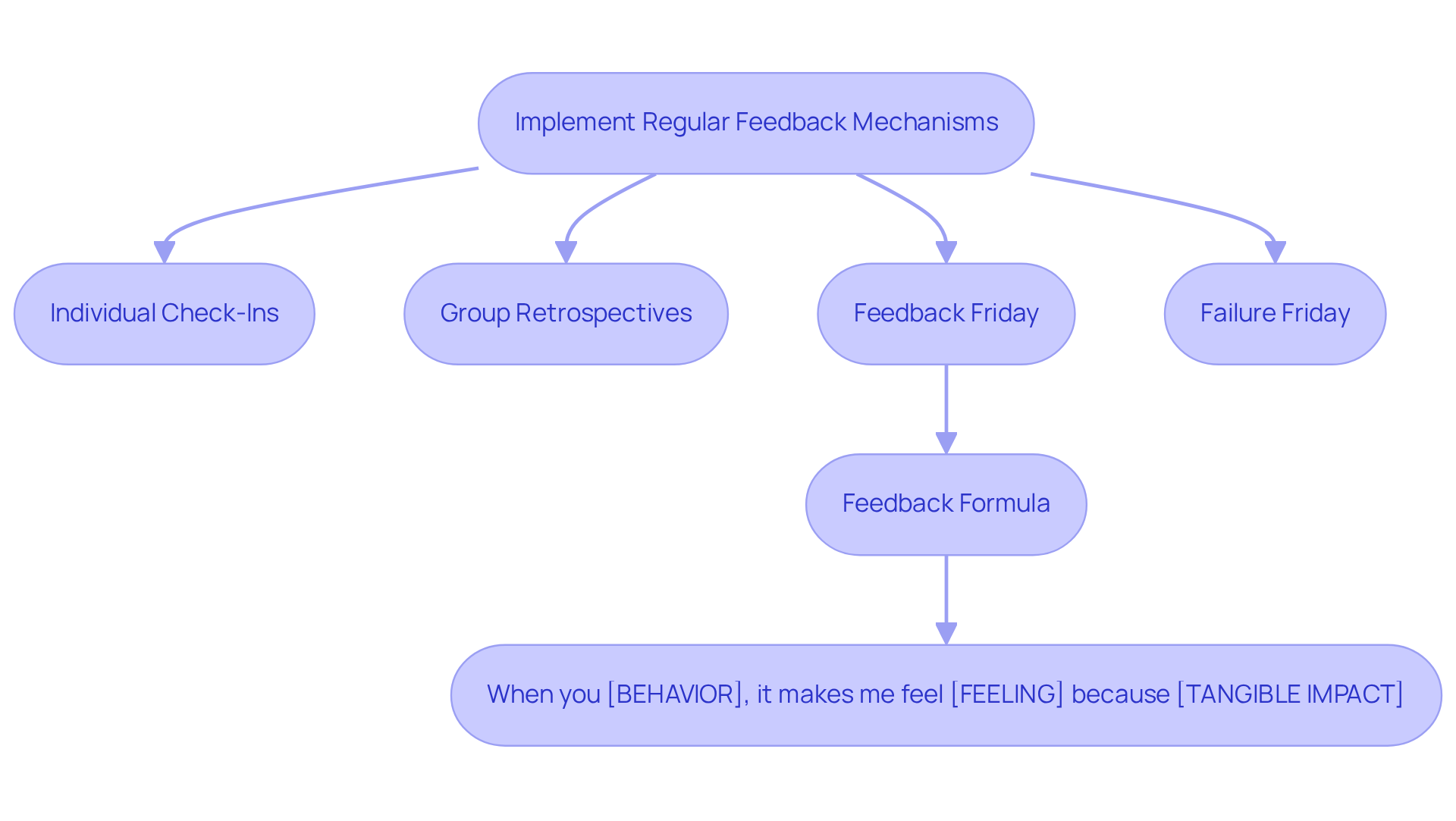
Leverage Technology for Task Management and Automation
Startups should seriously consider adopting Casy to automate task assignments and track progress effectively. Why? Because Casy seamlessly integrates with popular communication platforms like Slack and Telegram, automatically capturing discussions and transforming them into actionable tasks. This unique capability significantly reduces manual input and minimizes errors, ultimately enhancing work performance and overall productivity.
Furthermore, Casy's built-in automation features enhance work performance by facilitating workflow management and ensuring timely task completion without the need for constant oversight. Imagine the efficiency gains! By leveraging Casy's technology, startups can significantly enhance their work performance in task management, driving growth and innovation in their operations. Are you ready to enhance your team's productivity and streamline your processes? It’s time to embrace Casy and unlock your startup's potential.
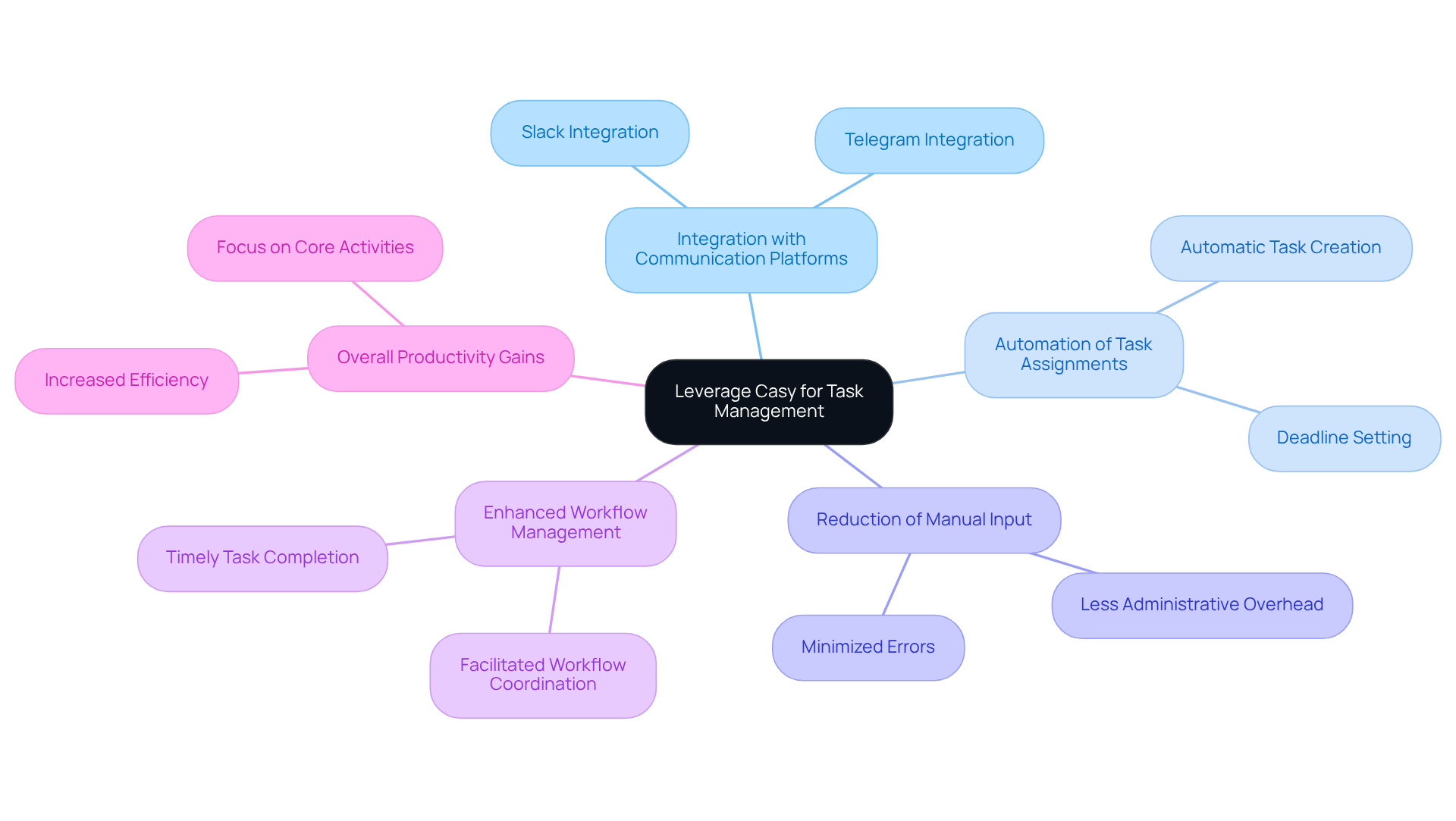
Recognize and Reward Employee Contributions
Startups must prioritize recognition programs that celebrate both individual and group achievements. Such initiatives can manifest as:
- Formal awards
- Public acknowledgments during meetings
- Simple thank-you notes
Tailoring recognition to individual preferences—offering public accolades for some and private praise for others—can significantly enhance its effectiveness. As Ned Curic, Chief Engineering and Technology Officer at Stellantis, aptly noted, 'These new companies help us advance more rapidly and effectively in developing technology that enhances people’s lives.' This statement underscores the importance of acknowledging contributions that foster innovation.
For example, establishing a 'Wall of Fame' to showcase members' achievements cultivates a sense of pride and community. Moreover, providing tangible rewards, such as bonuses or additional time off, can serve as powerful motivators, encouraging employees to strive for excellence. According to the 2025 Venture Awards, recognition through awards can establish trust with potential clients and bolster team morale for new businesses. By implementing these strategies, startups can cultivate a culture of recognition that not only boosts morale but also drives performance.
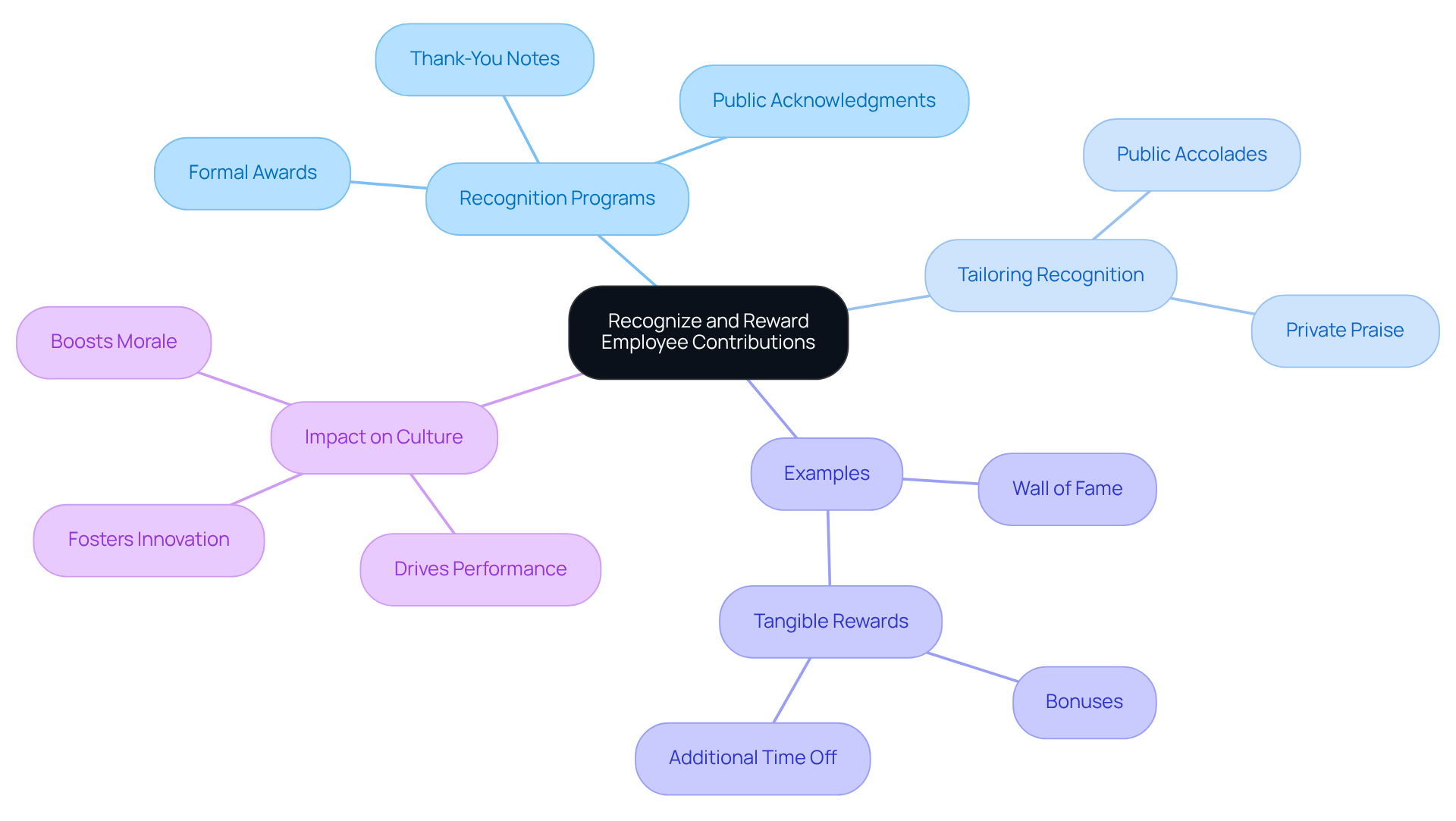
Conclusion
Establishing a high-performance culture in startups is essential for navigating the dynamic business landscape. By implementing clear goals through the SMART framework, fostering open communication, and leveraging technology, startups can create an environment that not only enhances productivity but also drives innovation. These strategies collectively empower teams to align their efforts, collaborate effectively, and maintain a focus on achieving shared objectives.
Key insights from this discussion highlight the importance of regular feedback mechanisms. These can significantly improve employee engagement and performance. Utilizing tools for task management and automation streamlines workflows and minimizes errors, allowing teams to focus on what truly matters. Additionally, recognizing and rewarding employee contributions fosters a sense of belonging and motivation, which is crucial for sustaining high morale in a startup setting.
Ultimately, the application of these strategies can transform a startup's work environment into one that thrives on collaboration and innovation. By prioritizing clear communication, structured feedback, and recognition, startups can not only enhance their work performance but also create a culture that attracts and retains top talent. Embracing these practices is not just beneficial; it is vital for any startup aiming to succeed and grow in an increasingly competitive market.
Frequently Asked Questions
What is the SMART criteria for setting objectives in startups?
The SMART criteria stands for Specific, Measurable, Achievable, Relevant, and Time-bound. This framework helps clarify goals and drives work performance.
How can a startup ensure its objectives are specific?
Objectives should clearly define what is to be achieved. For example, instead of saying "increase sales," a specific objective would be "increase sales by 20% in the next quarter through the launch of a targeted marketing campaign."
What does it mean for an objective to be measurable?
A measurable objective includes clear metrics to gauge success. For instance, "reduce customer churn by 2% in the next year" provides a specific metric to track progress.
Why is it important for objectives to be attainable?
Objectives should be realistic and achievable to avoid discouragement within the team. Setting impractical expectations can lead to frustration and decreased motivation.
How do relevant objectives contribute to a startup's success?
Relevant objectives ensure alignment with broader business aims, making certain that every effort contributes to the overall success of the startup.
What role do deadlines play in setting objectives?
Time-bound objectives include specific deadlines, which help maintain focus and ensure consistent progress toward completion.
How can startups foster flexibility in their objectives?
Regularly reviewing and refining objectives based on team feedback and evolving market conditions fosters flexibility and concentration.
What are OKRs and how do they enhance performance?
OKRs (Objectives and Key Results) are tools that enhance tracking progress and ensuring alignment across teams, creating a sense of responsibility and driving work performance.
Why is open communication important in startups?
Open communication enhances work performance by ensuring teams remain coordinated and informed, which is vital for innovation and problem-solving.
What are some effective tools for fostering collaboration in startups?
Collaborative tools such as Slack or Microsoft Teams facilitate continuous communication, allowing for real-time updates and smooth information sharing among team members.
How does a culture of transparency benefit a startup?
A transparent work environment encourages feedback and active listening, helping to identify issues early and enhancing connections among team members, which can lead to innovative solutions.
What impact does open communication have on employee satisfaction?
Organizations that prioritize open communication experience lower turnover rates and higher employee satisfaction, highlighting its importance for enhancing work performance.




